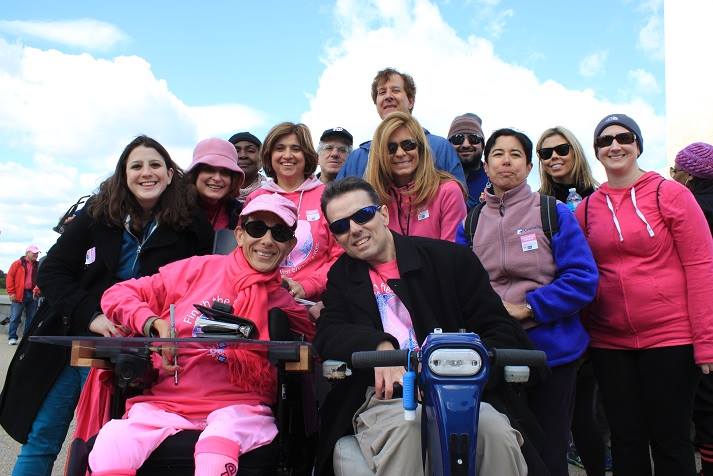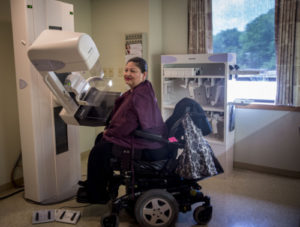It’s Not Easy, But You Must Get Your Mammogram
October is Breast Cancer Awareness Month and I am celebrating the fact that I am a seven-year survivor.

As a quadriplegic for 34 years, my diagnosis in 2010 was the last thing I expected. I had dealt with a multitude of health issues, but cancer wasn’t even on my radar. And without the ability to do my own breast exams and the inconvenience of mammography and pap smears, I did not have breast health anywhere near the top of my list.
After returning home from Shepherd Rehabilitation Center still recovering from serious complications that developed after having wound surgery, I was incredibly weak and marginally healthy. One morning as I was getting dressed, my aide felt a lump in my breast. I didn’t do daily or even weekly breast examinations and my OB/GYN had never done one — in retrospect, that is not acceptable! I realized it was time for a mammogram, so I scheduled it and I went.
When you have an SCI, getting a mammogram is like being a contortionist. Trying to get your breast into the machine and maneuver with your armrests and wheelchair is next to impossible. That, plus the complete discomfort of trying to lean forward in the right position makes getting a mammogram one of the most difficult exams for us.
After completion, I heard the technician whispering I needed to get a diagnostic mammogram. I did not know what that meant, but I had to do the tests all over again. I wasn’t worried until they told me that they wanted to do a biopsy and there was an opening available that day. There is no history of breast cancer in my family, so I had hopes it was just a blip in the result.
My Scans Have Been Clean
On July 7, 2010, I got a call from my OB/GYN telling me I had breast cancer. He gave me the names of doctors to call. I was in a state of shock and could not easily process what he was saying. The medical system is usually slow, but when you have breast cancer, it moves at rocket speed. I saw an oncologist and a surgeon, and reviewed all of the options. Because I cannot feel heat, radiation was not an option for me. Luckily we had discovered the cancer early. It was Stage I and not an aggressive form of cancer so I did not require chemotherapy. That was a blessing because at the time I was too weak to endure it.
Given the options, I decided to have a right mastectomy. I was not a candidate for reconstruction because I have no muscle, so I wear a prosthetic bra. I did not take any medication after the surgery because the side effects impact bone density and as a woman with SCI I have a high risk of bone fracture and I did not want to make it worse. For the first and second year I had to do a mammogram every six months and now it is once a year. My scans have been clean.
Saying “I have cancer” is a phrase I never imagined coming out of my mouth. Even though talking about medical issues is commonplace when you are a quadriplegic, having breast cancer seemed like the most unlikely health problem I would have. It just goes to show you that anyone can get cancer. It does not discriminate.

My experience opened my eyes to the lack of accessibility in breast cancer prevention and the lack of knowledge on behalf of women with disabilities as to what is needed for maintaining breast health. It also highlighted the lack of knowledge in the medical profession regarding testing and treating people with SCI for breast cancer.
Medical imaging is improving and treatments for breast cancer have become more customized. Genetic testing is available. With more information, those that are diagnosed have greater options and increased chances that early intervention will improve outcomes. This is all good news.
But it is not enough. Women of all ages are dying of breast cancer. Diagnosis is occurring earlier, but some forms of cancer are aggressive and treatments are debilitating. The underlying causes of many types of breast cancer remain a mystery and funding is not nearly enough to find a cure. There is much more to do.
And, there is more that we can accomplish individually and collectively as a disability community. Raising awareness of this deadly disease is important, but something as simple as doing a daily breast exam can help prevent diagnosis at a later stage when treatment is more difficult. If you cannot do it yourself, find someone who will. Early intervention is critical for quality of life and is proven to result in more successful outcomes. There are still medical professionals that do not routinely do a breast exam during a physical. You must demand the highest level of care from your provider.
Most importantly, there is technology available for fully accessible mammography that makes the process simpler and less arduous. But it is not being purchased by radiology centers and hospitals. Health care entities have large medical device contracts with well-known companies and continue to purchase new mammography machines under contracts with those same brand names. We must advocate for this accessible technology to be made available in our local centers. Additionally, many vans that drive to communities to give free mammograms do not have lifts. This is not acceptable!
There is huge potential to make positive change for those with disabilities that have recently or may be diagnosed with breast cancer. Here are some tips:
• Ask questions
• Know your family history
• Understand there are free resources available from organizations like the American Cancer Society.
When you make your mammogram appointment, ask for an extended session and additional personnel to be present. Don’t wait until you get there. And, policymakers must hear from “real people with disabilities” that access is primary and cutting costs for research ultimately results in unemployment, poverty and an increase in other chronic health care conditions that cost more money for individuals, providers, and insurers. This downward spiral for anyone who is diagnosed and treated with breast cancer can be avoided.
We have the power, as a community, to move the dial forward in the fight against breast cancer. Join me on this journey. It will empower you and those around you. Start today by getting your mammogram. And if you do not experience doctors and health personnel that treat you equally, advocate. The status quo is not enough.

